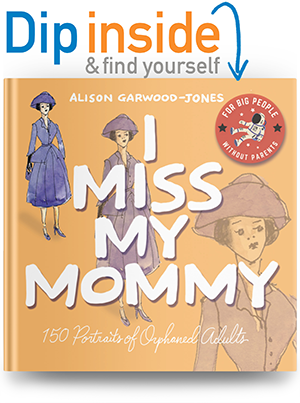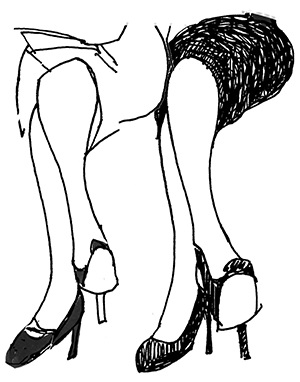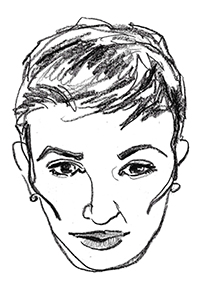In conversation with Erin Cooper Gay
May 22, 2012
“In Conversation” is a popular Q&A Segment on “Society Pages” that features interviews with creative risk takers. So far, I’ve profiled Bruce Mau, an industrial designer turned global thinker, Maureen Judge, a Genie Award-winning filmmaker whose real life docs focus on family dynamics, and Evan Jones, a pioneer in Alternate Reality Games. Evan’s computer feats have forever changed our relationship to our phones, TVs and computers and have won him not one, but two Emmy Awards.
 Bo Huang Photography
Bo Huang Photography
Last week I sat down with Erin Cooper Gay (pictured above). I met Erin a few months ago when we struck up a conversation at a Robbie Burns Day celebration. When I asked Erin what field she was in, she said, “I play the French horn with the Toronto Symphony Orchestra … but I’m switching careers.” After a pause, I thought she was about to say something like, “I plan to teach full time.” Instead, she leaned in just as they were about to pipe in the haggis and said, “I’m training to become a singer.” Career switches fascinate me, so I asked if I could call her.
Not many among us have the guts to follow a whisper in another direction, especially something as exacting and as public as, in Erin’s case, belting out love songs in foreign languages. She wants to specialize in Baroque music. Here’s what Erin told me about her move from the orchestra pit to centre stage.
AGJ: After we met, I went to your website and listened to snippets of your voice. [I invite my readers to do the same here]. When I heard you sing the libretto from Purcell’s Fairy Queen, I got a prickly neck. We’ve all heard about people who go half a lifetime not knowing they can sing or paint. Are you one of those?
ECG: [Laughs] No. My mom [Ann Cooper Gay] started the High Park Girls Choir in Toronto when I was seven and I was heavily involved in that until I was 16 — first as a singer, then a teaching assistant and finally as assistant conductor. And my dad [Errol Gay] was the librarian and a frequent guest conductor for the Toronto Symphony Orchestra. I grew up doing my homework in the stacks at Roy Thomson Hall and hung out a lot backstage. This was my world. I knew all the musicians from the time I was knee-high.
AGJ: With all that exposure, then, what did that little kid dream of becoming?
ECG: Ha! Good question. I always knew I would be a musician, but I didn’t know what form it would take. In the beginning, I was totally romanced by the idea of being in the orchestra. I wanted to be in the back of the pit cracking jokes with the boys because I was always a bit of a tomboy. The horn felt natural to me and I wanted to shine at it, but I’ve never had the same passion for it as I do for singing.
AGJ: So what held you back from pursuing singing first?
ECG: I didn’t see myself working to become an opera diva. Years ago, my mom was an opera singer with the Canadian Opera Company. She’s Texan and really charismatic, and I love that about her, but maybe early on I balanced things out by being more quiet and that’s why I chose the horn first. Like any kid, you want to forge your own path. With both my parents being musicians, I didn’t want to be known for doing exactly what they were doing.
AGJ: Was there a moment that changed all that?
ECG: Yeah. Five years ago, my dad wrote an opera called A Dickens of a Christmas for the Canadian Children’s Opera Company that premiered at the Enwave Theatre at the Harbourfront Centre. Dad and I were going through his first draft of the score and he asked if I could record all the parts for him. I did my best baritone, tenor and soprano voices just so he would have something on tape. Later, the singer who was playing Scrooge (a baritone named Mark Pedrotti) said to him ‘I think Erin’s really got a voice. Why doesn’t she come and study with me?’ I jumped at the chance because Mark is so wonderful [Pedrotti has performed as a soloist at at the Lincoln Centre in New York, The Kennedy Centre in Washington D.C., and the Mozarteum in Salzburg, among other venues]. At that point, I had just come back from Seattle after the breakup of my marriage, and I while I really wanted to play for the TSO [out West she had been playing with the Seattle and Vancouver Symphonies], I was starting to feel like I needed something else. I wanted to sing, but I didn’t know if it was going to go anywhere. Still, I felt like I had to take a chance. It was now or never!
AGJ: Is Mark your only teacher?
ECG: No, I have multiple teachers and mentors. When soprano Laura Claycomb came to Toronto to perform with the Canadian Opera Company as Gilda in Rigoletto, she took to my family. She’s a Texan. So am I. I was born in Alpine, Texas, but we moved to Toronto when I was three. I suppose you could say I’m fiercely Canadian, but with a Texan pride. Laura is from Dallas, which is where my mom is from. We all hit it off and Laura came to Easter Dinner at my parents’ place. By then, I had been studying with Mark for two years and he was saying that it was important for me to also start working with female singers. The timing was perfect. I met Laura, she offered to hear me sing, and what was supposed to be an hour meeting turned into four. We immediately discovered we work the same way, so we didn’t stop until things improved. At the end of the session, Laura invited me to her home in Italy. She’s been living in Europe for over ten years, just outside Turin with her husband “Tullio from Puglia!” [said with a lyrical Italian accent]. Laura was taking that whole summer off so I joined her in Turin, rented a room and we worked for three or four hours every day for 10 weeks.
AGJ: Are you working with anyone else?
ECG: After I met Laura, my world just opened up. I started singing for other veterans in the industry and they kept introducing me to more people I should know and programs I should take to hone my craft. In January, [soprano] Mary Morrison, [the guru of voice in Canada], took me on as one of her students. She’s 85 and made her radio debut on CBC Radio in 1944. Every single lesson with Mary has been gold. Her approach is very Scottish. She’s exacting and no-nonsense. Then not long after Mary I met Daniel Taylor, the countertenor. I went back stage after one of his performances with Tafelmusik. Later I sang for him and he said, ‘You need to come out to the Victoria Baroque Institute,’ and I was like, “Huh?” It’s so funny when Dan will say something in passing and it’s piece of music or a program that I don’t know about. He always says, ‘What do you mean you don’t know about X?! You need to know this NOW!’
AGJ: Didn’t you mention you’ve also been travelling to Quebec?
ECG: Yes. Last summer I met Bernard Labadie when he was guest conducting with the TSO. [Bernard is the founder and artistic director of two ensembles, the orchestra Les Violons du Roy and the choir La Chapelle de Québec, and has established himself worldwide as a leading conductor of the Baroque repertoire]. I was on second horn in the TSO when he was conducting, but I also worked with him briefly a few years ago when I coached the little kids who were playing the three spirits in the TSO’s production of The Magic Flute. Bernard is also very exacting and demanding and a fantastic conductor, particularly of 17th and 18th-century music. He remembered me and agreed to hear me sing. Afterwards, he said, ‘I think there’s something there. You need to work out some technical stuff, but I can help you with that.’ I took my dog Obi [a big, friendly chocolate lab] and we headed to Québec City last July to work with Bernard. He’s coached me several times since then. [In addition to playing French horn for the TSO, Erin is also playing for Labadie’s Les Violins du Roy and singing in his choir La Chapelle de Québec which performed the St. John Passion last Christmas at Carnegie Hall].
 “Obi howls when I’m practicing my horn. But for whatever reason, he doesn’t howl when I’m singing. He likes to lie on my feet. Maybe he can feel the vibrations.” Bo Huang Photography
“Obi howls when I’m practicing my horn. But for whatever reason, he doesn’t howl when I’m singing. He likes to lie on my feet. Maybe he can feel the vibrations.” Bo Huang Photography
AGJ: Who’s your favourite singer?
ECG: Emma Kirkby, hands down. She’s the grande dame of early music singing and, in my mind, she’s IT. [Emma studied classics at Oxford then worked as a school teacher, singing in choirs for pleasure. When she started her voice wasn’t large, so she wasn’t a standout or an obvious star-in-the-making. But her fascination with early Renaissance and Baroque music, and all its associated instruments, was unique to the late 1960s and early seventies. Kirkby trained for decades, kept singing in ensembles and carved out a niche for herself, slowly rising to become Dame Commander of the Order of the British Empire in 2007. Kirkby’s awards are well deserved, but what Cooper Gay seems to be drawn to isn’t her volume, but the crystal clarity of her voice].
AGJ: Has Kirky’s voice affected yours?
ECG: Yeah, I gravitate to singers, like Kirkby, who don’t manipulate their voices a lot. I’ve always wanted a more natural-sounding singing voice, so I work hard on creating a more natural vibrato. For me, it’s not about adding more volume and vibrato, but freeing up my voice and spinning it. My teachers, like me, believe that there should be a connection between your speaking voice and your singing voice. I naturally speak quite quite low with some resonance, so for me to all of a sudden go, “Laaaaaaaaa!” [she screams a high F in my ear], is just plain jarring. I want to use a straight tone as an expressive tool.
AGJ: Hmm, I like that. I think I became a better writer the moment I stopped trying to be writerly and started making my writing voice match my speaking voice. That’s when I learned how to put a more natural tone and rhythm down on the page. I didn’t know that applied to singing as well.
ECG: You talk about singing naturally … well, I secretly always wanted to sing, not like this or that famous diva, but like a choirboy in the Vienna Boys Choir. Oddly enough, I didn’t understand why I couldn’t grow up and be a choirboy! I was upset that I couldn’t get the same tone — it’s pungent and so focused and, yet, has this unbelievable warmth and roundness to it that girls can’t come close to. I’ve always gravitated to that sound. I even think, at one point, I manipulated my voice to try and sound like a boy soprano. All the musicisans I admire say, ‘Go back to the text and sing it like you would speak it, like it’s the most natural thing in the world.’ When you do that it’s easier to connect with your audience.
AGJ: What’s a typical week like for you?
ECG: Well, it’s not just singing and orchestral performances. I also teach horn to several students. And I’m still a vocal coach. Almost every day of the week I’m getting ready for my next recital, so I’m memorizing, singing over and over or listening to recordings and repeating the text and speaking it as if I were an actor. On Tuesdays I sing in a master class at the University of Toronto after which I run down to Roy Thomson Hall for rehearsals with the TSO. Did I mention I’m also back in school?
AGJ: No. What are you taking?
ECG: When I met Daniel Taylor, he convinced me to join his one-year advanced certificate program in early music, so I’m studying for that too.
AGJ: Wow, your schedule is full. Do you need a nap? Can I take one for you?
ECG: It’s a very busy time! And because I’m a freelance soprano I also take care of lots of organizing and self-promoting for my recitals at ateliers and small venues. One thing I’ve realized is that with an orchestra, you sit in the back, play your part and go home. The music director and the marketing department handle everything else. But as a freelancer, you invest much more of yourself not just in performing, but in organizing and event planning. At least that’s how it is when you’re first starting out. It’s A LOT of work, but I like the feeling of ownership I have over everything.
AGJ: Do you live in a house where you can really let it rip, vocally-speaking?
ECG: I live in a condo. Luckily the guy next to me is also in the music biz, so he gets it. He’s into digital recording. We’ve worked out our schedules but, still, I’d like to move at some point because it’s a bit expensive where I am. Ideally, I’d love to house sit for someone to reduce my costs and sing and play as I want. As a musician, you never want to feel muffled in any way. You need to be able to go to extremes to find your sound.
AGJ: Are you keen to see more people in their 20s and 30s getting into opera?
ECG: Yes! I grew up in a musical family and had this really narrow path and narrow perspective, so I haven’t really met too many people outside that world. The coolest thing about having my dog is that Obi introduces me to people from all walks of life when we’re in the dog park. I’ve struck up so many friendships with people in other fields and it’s amazing to tell them what I do. Some go, ‘Oh, what’s that?’ Others have so much knowledge. — like this one woman I met who said, ‘I love Prokofiev’s piano music.’ And I was like, ‘Really?!’ Baroque and early music is hot right now with the general public, and it’s lot easier to sell to the younger crowds.
AGJ: As a freelance writer, I’m always interested in the logistics of how someone pays their bills without giving up on their dream. I write, I teach and pick up shifts at a neighbourhood pub to make ends meet. How do you make it work?
ECG: I have a patchwork income too. And I’m not even sure I consciously designed it that way. When an opportunity comes up I go for it. I’ve always made things work, but maybe not in the smartest way, financially-speaking. Like going to Italy to study with Laura. I’m in debt right now from that trip and still trying to work it out with a money coach. To get your dream off the ground, though, sometimes you have to sacrifice being financially responsible up to a certain point, then figure it out later.
AGJ: Where do you dream of performing?
ECG: Severence Hall in Cleveland.
AGJ: Really? I was expecting to hear La Fenice in Venice. Why Cleveland?
ECG: I went to school at the Cleveland Institute of Music. And I went there because of the Cleveland Orchestra. The caliber of musicians in that orchestra is second to none, as good as any in Vienna or Berlin. I can still pick them out in recordings. I had incredible teachers in Cleveland and had the opportunity to play with the Orchestra nearing the end of my time there [she was subbing for them]. It was a thrill to sit on the stage of Severance Hall, one of the most beautiful concert halls in the world. I dreamed in college of playing for the Cleveland Orchestra and I did, so performing there as a soprano would be like coming home.





























Leave a Reply